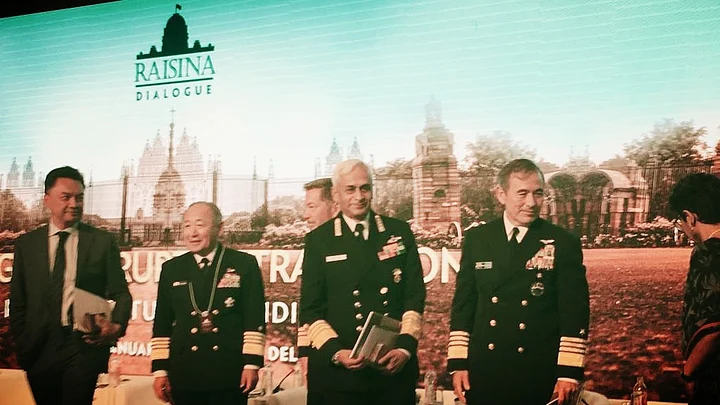Day 3 of the Raisina Dialogue, halfway through the itinerary, a panel of naval chiefs of the Quad countries – India, Australia, Japan, and US – sat down to discuss how best to address the rise of a common foe: China.
2018 will be the year of courage, Admiral Harry Harris Jr, Commander of the US Pacific Command, hoped.
Dino Patti Djalal, of the Foreign Policy Community of Indonesia, was on the panel too, and observed that China's rise was a reality for the region: It could not be checked, like any major power could not be checked – not India, not the US, not Russia. So, he said, there is a need to accommodate it peacefully – the problem, in his view, is that though everyone knows what is to be done, there's a "poverty of ideas" about how to do it.
To give a sense of the scale of the problem that the liberal maritime order is facing in an aggressive China, Admiral Sunil Lanba, India's Chief of Naval Staff, said Chinese presence in the Indian Ocean – India's backyard – would be a pattern in the near future:
The Chinese already have a naval base in Djibouti and we’re aware of their base in Hambantota. So this is going to be the pattern for the near future in the Indian Ocean.Sunil Lanba, Chief of Staff, Indian Navy
So what is the solution for India and aligned countries? Dialogue and increased cooperation, the panelists agreed. Vice Admiral Tim Barrett, Chief of Navy, Australia, had a word of caution, though: Don't let the "plethora of fora" become a stand-in for concrete action:
Speaking to The Quint, Vice Admiral Tim Barrett, elaborated on this point and said that one of the reasons multilateral groupings have not been able to visit any real consequences on China – for example, condoning of China conducting naval drills in the Yellow Sea in 2017, or the military buildup on artificial Islands in the South China Sea in the first weeks of 2018, despite China's assurances that there would be no such military buildup – was because the aligned nations spend too much time talking and not enough time doing.
Talk is cheap, and the different international groupings sort of start competing with each other instead of getting things done.Tim Barrett, Vice Admiral, Australian Chief of Navy
Admiral Harry Harris Jr, Commander of US Pacific Command, had strong words for China:
The reality is that China is a disruptive transitional force in the Indo-Pacific, they are the owner of the trust deficit in the region.Admiral Harry Harris Jr, Commander of US Pacific Command
Given this trust deficit, blamed on China, the panelists suggested ways in which the mistrust could be overcome.
Djalal said, "One of the best measures of China's intentions in the region will be whether it chooses to finalise a Code of Conduct (at ASEAN)."
Multilateral fora, like the Quad, place importance on openness and transparency. So when Vice Admiral Barrett was asked whether China would be welcome at any one of the various regional multilateral Indo-Pacific groupings in that spirit, he told The Quint:
Well, if they wanted to join AusIndex, we’d say ‘great, let’s talk about it some more at the Western Pacific Naval Symposium (WPNS).’ We would have to look at their intentions, if they’re genuine, let’s talk about it at WPNS, we wouldn’t say ‘No, you can’t join.’Vice Admiral Barrett
Not a yes, and a not a no. China will have to work to regain trust among regional powers, but will it want to?
As Djalal said, ‘strategic ego’ is a stumbling block.
There’s a strategic ego. For example, if China offers BRI, US won’t join. Why? Joining would be accepting China’s leadership. Same with Russia and others. On one hand, we need regional architecture. On the other, major powers can’t make that strategic leap.Dino Patti Djalal
(We Indians have much to talk about these days. But what would you tell India if you had the chance? Pick up the phone and write or record your Letter To India. Don’t be silent, tell her how you feel. Mail us your letter at lettertoindia@thequint.com. We’ll make sure India gets your message.)
(At The Quint, we question everything. Play an active role in shaping our journalism by becoming a member today.)
